一般过去时
一般过去时单词表
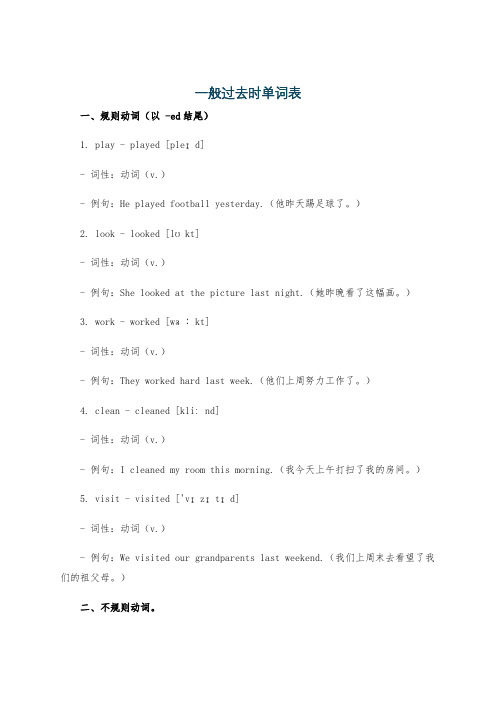
一般过去时单词表一、规则动词(以 -ed结尾)1. play - played [pleɪd]- 词性:动词(v.)- 例句:He played football yesterday.(他昨天踢足球了。
)2. look - looked [lʊkt]- 词性:动词(v.)- 例句:She looked at the picture last night.(她昨晚看了这幅画。
)3. work - worked [wɜːkt]- 词性:动词(v.)- 例句:They worked hard last week.(他们上周努力工作了。
)4. clean - cleaned [kliːnd]- 词性:动词(v.)- 例句:I cleaned my room this morning.(我今天上午打扫了我的房间。
)5. visit - visited ['vɪzɪtɪd]- 词性:动词(v.)- 例句:We visited our grandparents last weekend.(我们上周末去看望了我们的祖父母。
)二、不规则动词。
1. go - went [went]- 词性:动词(v.)- 例句:He went to school by bike yesterday.(他昨天骑自行车去上学了。
)2. see - saw [sɔː]- 词性:动词(v.)- 例句:I saw a movie last night.(我昨晚看了一部电影。
)3. eat - ate [eɪt]- 词性:动词(v.)- 例句:She ate an apple this morning.(她今天上午吃了一个苹果。
)4. come - came [keɪm]- 词性:动词(v.)- 例句:They came to my house last Sunday.(他们上周日来到了我家。
)5. do - did [dɪd]- 词性:动词(v.)- 例句:What did you do yesterday?(你昨天做了什么?)6. have - had [hæd]- 词性:动词(v.)- 例句:He had a great time at the party last night.(他昨晚在聚会上玩得很开心。
一般过去时 用法
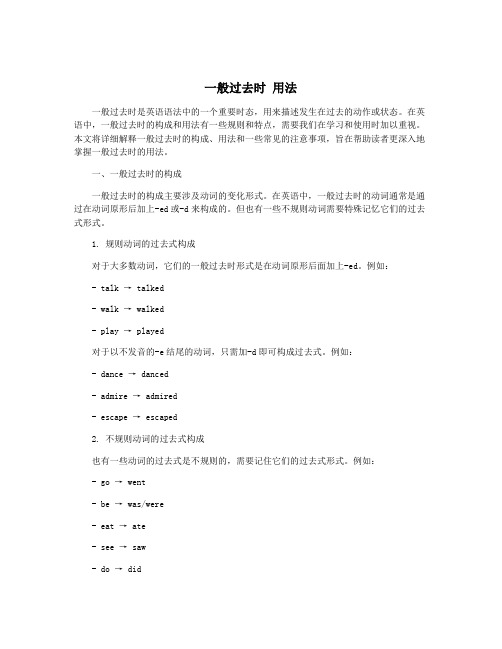
一般过去时用法一般过去时是英语语法中的一个重要时态,用来描述发生在过去的动作或状态。
在英语中,一般过去时的构成和用法有一些规则和特点,需要我们在学习和使用时加以重视。
本文将详细解释一般过去时的构成、用法和一些常见的注意事项,旨在帮助读者更深入地掌握一般过去时的用法。
一、一般过去时的构成一般过去时的构成主要涉及动词的变化形式。
在英语中,一般过去时的动词通常是通过在动词原形后加上-ed或-d来构成的。
但也有一些不规则动词需要特殊记忆它们的过去式形式。
1. 规则动词的过去式构成对于大多数动词,它们的一般过去时形式是在动词原形后面加上-ed。
例如:- talk → talked- walk → walked- play → played对于以不发音的-e结尾的动词,只需加-d即可构成过去式。
例如:- dance → danced- admire → admired- escape → escaped2. 不规则动词的过去式构成也有一些动词的过去式是不规则的,需要记住它们的过去式形式。
例如:- go → went- be → was/were- eat → ate- see → saw- do → did以上是一般过去时构成的基本规则,掌握这些构成规则对于正确使用一般过去时非常重要。
下面我们将介绍一般过去时的用法。
二、一般过去时的用法一般过去时用来表示过去某个时刻或一段时间内的动作或状态。
在语法上,一般过去时还可以用于肯定句、否定句和疑问句中,其用法如下:1. 肯定句在肯定句中,一般过去时的动词形式是直接加上过去式。
例如:- I studied English last night.- She visited her grandparents yesterday.- We watched a movie on Friday.2. 否定句在否定句中,一般过去时的动词需要使用助动词did+ not构成,主语可以直接跟在助动词后,动词本身用原形。
一般过去时

三.一般过去时(simple past tense)1.概念一般过去时表示过去某一时刻,某一段时间发生的动作或存在的状态。
一般过去时用动词的过去式表示。
2.构成一般过去时用动词的过去式表示。
be的过去式有was,were两种; have 的过去式是had;规则动词的过去式在动词词尾加-ed,具体构成规则如下:1)一般情况,动词后加ed,例词work-worked,clean-cleaned,play-played,wash-washed2)以不发音的e结尾,-d,例词live-lived,move-moved,hope-hoped,arrive-arrived 3)以辅音字母+y结尾,变y为 i再加-ed,例词study-studied,carry-carried,cry-cried,identify-identified 4)以辅音字母结尾的重读闭音节,双写最后一个辅音字母加-ed,例词plan-plannedstop-stopped,beg-begged,grab-grabbed 3.用法 (1) 表示发生在过去的动作或存在的状态。
如:He went shopping with his friends last week.They arrived ten minutes ago.He became a hotel manager ten years ago.Did you go to the concert last night?(2) 表示在过去经常发生的动作或习惯动作。
如:He visited his grandparents once a month last year.She usually went to work by car last year.When I was at school, I always went to school by bus.4.如何识别一般过去时常见的标志词有:1). yesterday, the day before yesterday.2). last week / year / month / term …(简称last系列)3). two hours ago, three years ago, a moment ago…(简称ago系列)4). in / on + 过去的年/月/日,如 in 1999, on April, 20055). just now, once upon a time, one day…5.易错点例析:(1)——Your phone number again? I _________ quite catch it.——It’s 4331577A. didn’tB. couldn’tC. don’tD. can’t(2)——Mr. Smith isn’t coming tonight.——But he _________.A. promisesB. promisedC. will promiseD. had promised(3) ——Hey, look where you are going!——Oh, I’m terribly sorry. _________.A. I’m not noticingB. I wasn’t noticingC. I haven’t noticedD. I don’t notice(4) ——Oh it’s you ! I _________ you.——I’ve had my hai r cut.A. didn’t realizeB. haven’t realizedC. didn’t recognizeD. don’t recognized(5) ——Since you’ve agreed to go, why aren’t you getting ready?——But I _________ that you would have me start at once.A. don’t realizeB. didn’t realizeC. hadn’t realizedD. haven’t realized(6) ——It’s twelve o’clock, I think I must be off now.——Oh, really? I _________ it at all.A. don’t realizeB. haven’t realizedC. didn’t realizeD. hadn’t realizedKey:ABBCBC6.中考真题及模拟(2009朝阳区一模)He went into his room, _______ the light and began to work.A. has turned onB. will turn onC. turns onD. turned on(2009海淀一模)——What’s the best food have you had in Beijing, Alex?——Roast duck! I _________to a famous restaurant to have it last week.A. have goneB. goC. will goD. went(2009宣武区一模)——Do you know how many gold medals the 23-year-old Michael Phelps _____________at the 2008 Summer Olympic Games?——Eight.A. winB. winsC. wonD. has won(2008北京)We were in Qingdao last week and __________ great fun there.A. will haveB. have hadC. hadD. have(2007北京)——What did you do after school yesterday?——I _________basketball with my friends.A. playB. playedC. will playD. am playing(2005北京)---Hi, Kate. You look tired. What’s the matter?---I ______well last night.A. didn’t sleepB. don’t sleepC. haven’t sleptD. won’t sleep (2008四川泸州)Yesterday,Tony’s family _________ a good time.A. hasB. haveC. had(2007湖南湘潭)I’m sorry you’ve missed the train. It _______10 minutes ago.A. leftB. has leftC. had left(2007福州)——Mr Green, __________you________ Three Lanes and Alleys(三坊七巷)last Sunday?——No, but I’ll visit them next week.A. will; go toB. have; been toC. did; go toD. have; gone to (2007浙江)——What did the teacher say just now?——He __________us not to play computer games all day.A. tellsB. toldC. has toldD. is told(2007江西)——Inventors have changed the way we live.——So they are famous for the great things they _________.A. doB. didC. are doingD. had done(06江西)——Where’s the cake I made this morning?——We _______ it, mum. Can you make another one for us?A. ateB. eatC. will itD. were eating。
一般过去时
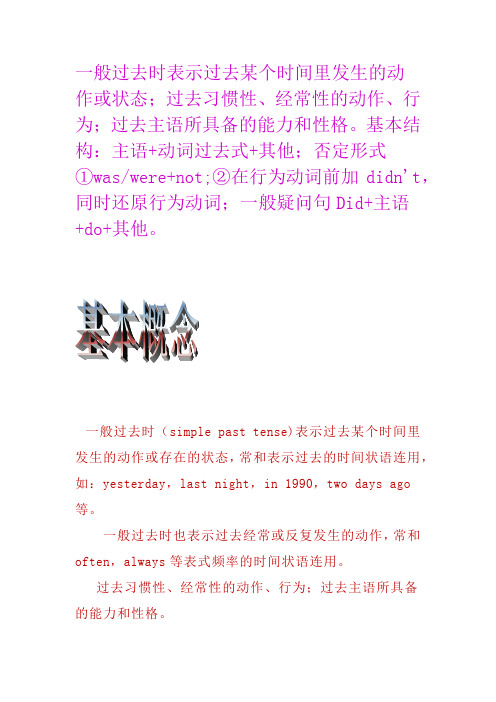
(1)一般过去时表示在过去某个特定时间发生,也可以表示过去习惯性、经常性的动作。
一般过去时不强调动作对现在的影响,只说明过去的事情。
句式:主语+动词过去式+宾语+其它I had a word with Julia this morning.今天早晨,我跟朱丽亚说了几句话。
He smoked many cigarettes a day until he gave up. 他没有戒烟的那阵子,抽烟抽得可凶了。
(2) 一般过去时常与表示过去的时间状语或从句连用,如:yesterday,last week,in 1993,at that time,once,during the war,before,a few days ago,when 等等。
补充内容:(句子中谓语动词是用一般过去时还是用现在完成时,取决于动作是否对现在有影响)。
Have you had your lunch? 你吃过午饭了吗?(你现在不饿吗?)Yes,I have. 是的,我已经吃过了。
(已经吃饱了,不想再吃了。
)When did you have it? 你是什么时候吃的?(关心的是吃的动作发生在何时。
)I had it about ten minutes ago. 我大约是十分钟以前吃的。
)Used to do something 表示过去常做而现在已经停止了的习惯动作。
I used to work fourteen hours a day. 我过去常常一天干十四个小时。
I ate it at 6:45。
我在六点四十五分吃了。
(3)带有确定的过去时间状语时,要用过去时。
如:yesterday(昨天)、two days ago…(两天前…… )、last year…(去年…)、the other day(前几天)、once upon a time(很久以前)、just now(刚才)、in the old days(过去的日子里)、before liberation(解放前…)、 When I was 8 years old(当我八岁时…)、at+一个时间点Did you have a party the other day?前几天,你们开了晚会了吗?Lei Feng was a good soldier.雷锋是个好战士。
英语学习:一般过去时特殊用法大全
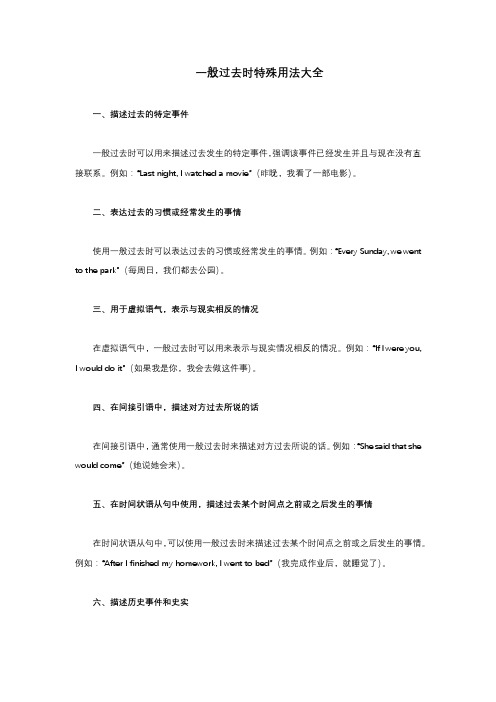
一般过去时特殊用法大全一、描述过去的特定事件一般过去时可以用来描述过去发生的特定事件,强调该事件已经发生并且与现在没有直接联系。
例如:“Last night, I watched a movie”(昨晚,我看了一部电影)。
二、表达过去的习惯或经常发生的事情使用一般过去时可以表达过去的习惯或经常发生的事情。
例如:“Every Sunday, we went to the park”(每周日,我们都去公园)。
三、用于虚拟语气,表示与现实相反的情况在虚拟语气中,一般过去时可以用来表示与现实情况相反的情况。
例如:“If I were you, I would do it”(如果我是你,我会去做这件事)。
四、在间接引语中,描述对方过去所说的话在间接引语中,通常使用一般过去时来描述对方过去所说的话。
例如:“She said that she would come”(她说她会来)。
五、在时间状语从句中使用,描述过去某个时间点之前或之后发生的事情在时间状语从句中,可以使用一般过去时来描述过去某个时间点之前或之后发生的事情。
例如:“After I finished my homework, I went to bed”(我完成作业后,就睡觉了)。
六、描述历史事件和史实在描述历史事件和史实时,通常使用一般过去时。
例如:“The Civil War broke out in 1861”(内战于1861年爆发)。
七、在文学和新闻报道中,描述过去发生的事情在文学和新闻报道中,使用一般过去时来描述过去发生的事情是非常常见的。
例如:“The news reported that the plane had crashed”(新闻报道称飞机失事了)。
八、在电影和电视剧中,描述虚构的过去事件在电影和电视剧中,一般过去时可以用来描述虚构的过去事件,以构建剧情。
例如:“In the movie, the characters traveled back in time to the 1920s”(在电影中,角色们穿越回了20世纪20年代)。
一般过去时
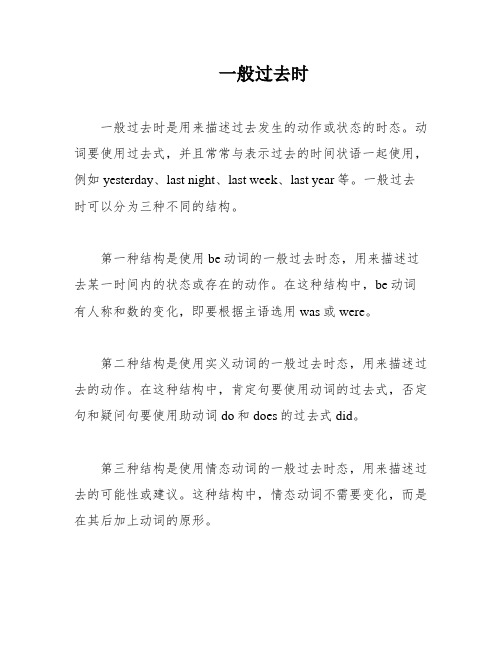
一般过去时一般过去时是用来描述过去发生的动作或状态的时态。
动词要使用过去式,并且常常与表示过去的时间状语一起使用,例如yesterday、last night、last week、last year等。
一般过去时可以分为三种不同的结构。
第一种结构是使用be动词的一般过去时态,用来描述过去某一时间内的状态或存在的动作。
在这种结构中,be动词有人称和数的变化,即要根据主语选用was或were。
第二种结构是使用实义动词的一般过去时态,用来描述过去的动作。
在这种结构中,肯定句要使用动词的过去式,否定句和疑问句要使用助动词do和does的过去式did。
第三种结构是使用情态动词的一般过去时态,用来描述过去的可能性或建议。
这种结构中,情态动词不需要变化,而是在其后加上动词的原形。
需要注意的是,在构成一般过去时的助动词did和didn't后面要跟动词的原形,而且do和does的过去时均为did。
因此,在使用一般过去时时,需要注意动词的形式和助动词的使用。
例如,原句“XXX.”可以改写为“XXX.”,否定句为“I didn’t do XXX.”,一般疑问句为“Did you do your homework yesterday?”,回答可以是“Yes。
I did.”或“No。
I didn’t.”。
1.情态动词的过去式为can→could。
may→might。
must→had to。
will→would。
should→should have。
2.特殊疑问句的构成形式有三种:a。
特殊疑问词+be过去式+主语+其他?b。
特殊疑问词+情态助动词过去式+主语+动词原形+其他?c。
特殊疑问词+do/does过去式+主语+动词原形+其他?例如:What was your former name?(你以前叫什么名字?)Why was he late for school last Monday?(上星期一他为什么迟到?)What could she do twenty years ago?(20年前她能做什么?)3.一般过去时的判断标志词包括:yesterday,the day before yesterday,last + 时间,this morning + 时间 + ago,just now,a moment ago,in + 过去的时间。
一般过去时定义,结构,标志词,用法

一般过去时定义,结构,标志词,用法一般过去时是英语中最基本的过去时态之一,它用于描述过去发生的动作或状态。
本文将介绍一般过去时的定义、结构、标志词和用法。
一、定义一般过去时是指发生在过去的动作或状态,不考虑其持续时间或是否已经完成。
它用于描述已经结束的事情,通常与表示过去的时间短语一起使用。
二、结构一般过去时的结构很简单,主要由动词的过去式构成。
对于大多数动词,过去式是在动词原形后加上-ed,如walked,talked,played 等。
但是,有一些动词的过去式是不规则的,需要记忆,如go的过去式是went,eat的过去式是ate等。
另外,一般过去时的肯定句结构为:主语 + 动词过去式 + 其他。
如:I walked to the park yesterday.(我昨天走到了公园。
)否定句的结构为:主语 + did not + 动词原形 + 其他。
如:I did not walk to the park yesterday.(我昨天没有走到公园。
)疑问句的结构为:Did + 主语 + 动词原形 + 其他?如:Did you walk to the park yesterday?(你昨天走到了公园吗?)三、标志词一般过去时的标志词有很多,其中最常见的有以下几种:1. 表示过去的时间短语,如yesterday(昨天)、last week(上个星期)、in 1999(在1999年)等。
2. 过去式的动词,如walked(走)、talked(谈话)、played(玩)等。
3. 过去式的助动词did,如did not(没做)、did you(你做了吗?)等。
四、用法一般过去时通常用于以下情况:1. 描述过去的事件或状态,如:I went to the park yesterday.(我昨天去了公园。
)2. 描述过去的习惯或经常性动作,如:When I was a child, I played with dolls every day.(我小时候每天都和玩偶玩。
一般过去时知识点
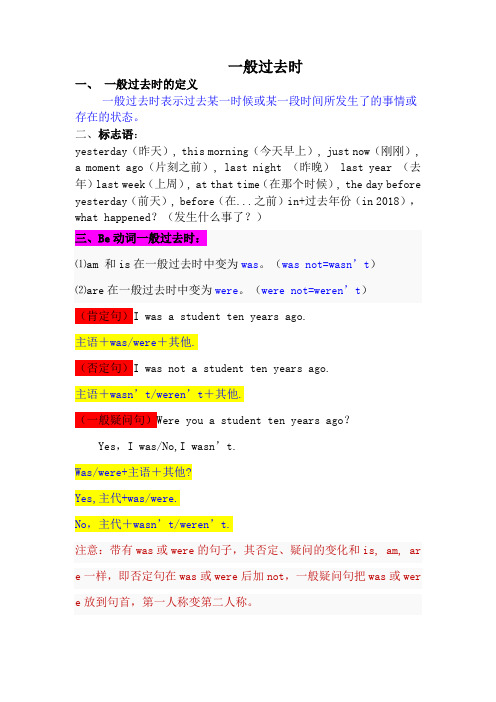
一般过去时一、一般过去时的定义一般过去时表示过去某一时候或某一段时间所发生了的事情或存在的状态。
二、标志语:yesterday(昨天), this morning(今天早上), just now(刚刚), a moment ago(片刻之前), last night (昨晚) last year (去年)last week(上周), at that time(在那个时候), the day before yesterday(前天), before(在...之前)in+过去年份(in 2018),what happened?(发生什么事了?)三、Be动词一般过去时:⑴am 和is在一般过去时中变为was。
(was not=wasn’t)⑵are在一般过去时中变为were。
(were not=weren’t)(肯定句)I was a student ten years ago.主语+was/were+其他.(否定句)I was not a student ten years ago.主语+wasn’t/weren’t+其他.(一般疑问句)Were you a student ten years ago?Yes,I was/No,I wasn’t.Was/were+主语+其他?Yes,主代+was/were.No,主代+wasn’t/weren’t.注意:带有was或were的句子,其否定、疑问的变化和is, am, ar e一样,即否定句在was或were后加not,一般疑问句把was或wer e放到句首,第一人称变第二人称。
(特殊疑问句)1.对I提问:Who was a student ten years ago?(Who作为主语时,谓语动词用三单)四、实义动词一般过去时:(肯定句)I walked to school yesterday.主语+动词过去式+其他.(否定句)I didn’t walk to school yesterday.主语+didn’t + 动词原形+其他.否定句变化规则:1、找be动词2、若无be动词,找情态动词(could)3、若无情态动词,请助动词(did)来帮助4、did放于主语的后面,动词的前面,加上not,did not= didn't5、动词变原形6、some->any and->or too->either(一般疑问句)Did you walk to school yesterday?Yes,I did. No,I didn’t.Did +主语+动词原形+其他?Yes,主代+did.No,主代+didn’t.一般疑问句变化规则:1、找be动词2、若无be动词,找情态动词(could)3、若无情态动词,请助动词(did)来帮助4、did放于开头,首字母大写5、第一人称变第二人称6、动词变原形7、some->any and->or too不变either(特殊疑问句)I went to school on foot yesterday.1.对I 提问:Who went to school on foot yesterday?2.对went to school 提问:What did you do on foot yesterday?3.对school 提问:Where did you go on foot yesterday?4.对on foot 提问:How did you go to school yesterday?5.对yesterday提问:When did you go to school on foot?动词变化规则:1、直接在动词后面加ed。
一般过去时

一般过去时(the past simple tense)用法:1.表示过去确定时间内发生的动作或状态,常与yesterday,last year, ago, once upon a time, just now, recently, during the day, for many years ect.2.表示过去连续发生的动作3.表示过去一段时间内经常或反复的动作,常与always ,never连用4.在since引导的从句中,主句用现在完成时,从句用一般过去时。
5.在时间,条件状语从句中,用一般过去时表示过去将来时结构:肯定:主+动词过去式+其他否定:主+wasn’t/weren’t +其他主+didn’t +动原+其他一般疑问句:was/were+主+动原+其他?Did +主+动原+其他?练习Ⅰ.用所给词的适当形式填空1.Jenny (not go to bed) until 11:00 o’clock last night.2.I (see) Li Lei (go) out just now.3.He (do) his homework every day. But he (not do)it yesterday.4.When I was young, I (play) games with my friends.5. She likes _________ newspapers, but she _________ a book yesterday. (read)6. _______ they ________ (sweep) the floor on Sunday? No, they _________.7.It ____ (be) the 2nd of November yesterday. Mr White ___ (go) to his office by car.8.I want to ______ apples. But my dad _______ all of them last month. (pick)9. Jim's mother _________ (plant) trees just now.10.He _______ football now, but they _______ basketball just now. (play)Ⅱ.改错1.How is Jane yesterday?2.What did he last week?3.Did you saw him just now?4.H e often goes home at 11:00 last month.5.Tom wasn’t watch TV last night.6.Tom suddenly is ill last night and have to stay at homefoeanother day.Ⅲ.改写句子1.I watched the night sky for about an hour. 改为否定句2.He waited for you three hours ago. 改为一般疑问句3.Was he a doctor two years ago? 做否定回答4.She went shopping with her friends. 对划线部分提问5.Karen had extra classes next week. 对划线部分提问。
一般过去时
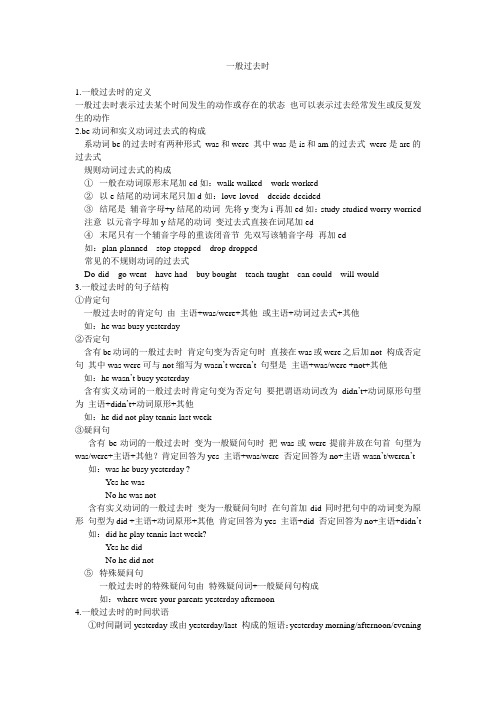
一般过去时1.一般过去时的定义一般过去时表示过去某个时间发生的动作或存在的状态也可以表示过去经常发生或反复发生的动作2.be动词和实义动词过去式的构成系动词be的过去时有两种形式was和were 其中was是is和am的过去式were是are的过去式规则动词过去式的构成①一般在动词原形末尾加ed如:walk-walked work-worked②以e结尾的动词末尾只加d如:love-loved decide-decided③结尾是辅音字母+y结尾的动词先将y变为i再加ed如:study-studied worry-worried注意以元音字母加y结尾的动词变过去式直接在词尾加ed④末尾只有一个辅音字母的重读闭音节先双写该辅音字母再加ed如:plan-planned stop-stopped drop-dropped常见的不规则动词的过去式Do-did go-went have-had buy-bought teach-taught can-could will-would3.一般过去时的句子结构①肯定句一般过去时的肯定句由主语+was/were+其他或主语+动词过去式+其他如:he was busy yesterday②否定句含有be动词的一般过去时肯定句变为否定句时直接在was或were之后加not 构成否定句其中was were可与not缩写为wasn’t weren’t 句型是主语+was/were +not+其他如:he wasn’t busy yesterday含有实义动词的一般过去时肯定句变为否定句要把谓语动词改为didn’t+动词原形句型为主语+didn’t+动词原形+其他如:he did not play tennis last week③疑问句含有be动词的一般过去时变为一般疑问句时把was或were提前并放在句首句型为was/were+主语+其他?肯定回答为yes 主语+was/were 否定回答为no+主语wasn’t/weren’t 如:was he busy yesterday ?Yes he wasNo he was not含有实义动词的一般过去时变为一般疑问句时在句首加did同时把句中的动词变为原形句型为did +主语+动词原形+其他肯定回答为yes 主语+did 否定回答为no+主语+didn’t 如:did he play tennis last week?Yes he didNo he did not⑤特殊疑问句一般过去时的特殊疑问句由特殊疑问词+一般疑问句构成如:where were your parents yesterday afternoon4.一般过去时的时间状语①时间副词yesterday或由yesterday/last 构成的短语:yesterday morning/afternoon/eveningthe day befor yeaterday ,last night/weekend/year/Sunday②时间段+ago构成的短语:two days ago,three years ago③介词+表示过去时间的词如:in 2005,on Aoril 1st④其他表示过去的词语或短语:just now,a morning ago,once,then等。
一般过去时的用法
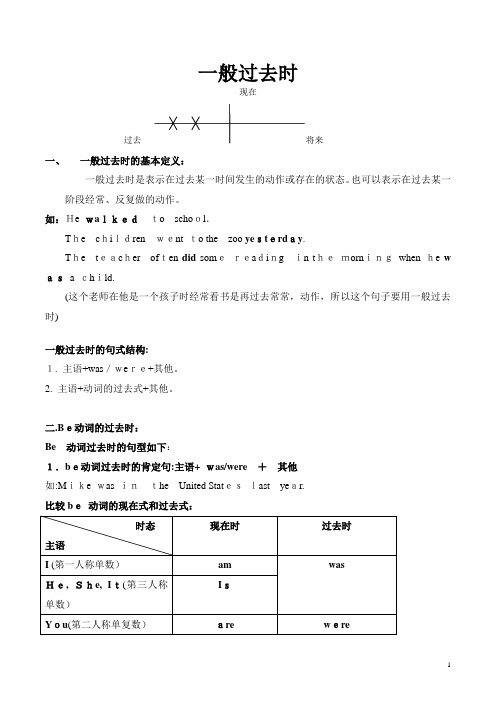
一般过去时现在过去将来一、 一般过去时的基本定义:一般过去时是表示在过去某一时间发生的动作或存在的状态。
也可以表示在过去某一阶段经常、反复做的动作。
如:He wa lked to scho ol .T he c hi ldren went to the zoo ye st erd ay .T he t eac her of ten did som e rea di ng in t he morn ing when he w as a ch ild.(这个老师在他是一个孩子时经常看书是再过去常常,动作,所以这个句子要用一般过去时)2. 主语+动词的过去式+其他。
二.B e动词的过去时: Be 动词过去时的句型如下:1.b e动词过去时的肯定句:主语+ was/were + 其他 如:M ike was in the United Stat es last ye ar. 比较b e 动词的现在式和过去式: 一般过去时的句式结构: 1. 主语+was /we re+其他。
如:Iwasvery tiredlast night.Youwere absentfrom school two daysago.There weresome booksthere. (那儿曾经有一些书。
)注意:Therebe句型用于一般过去时需把is/are 变为它们的过去式:There was (were) …2. Be动词过去时的否定句:主语+was/were+not+其他He wasnot inCanadalast year.Be 过去式的否定句结构,只要在was/were后面加上not 就可以了。
它的缩写形式为:wasn’t 和weren’t如:Iwasn’tbusy yesterday.There weren’t any boys in the room.3. Be动词过去时的疑问句:(1)was/were+ 主语+其他(一般疑问句)----Wasit rainingin Beijingyesterday?----No,itwasn’t. It was cloudy.(2)特殊疑问词+were/was+主语+其他(特殊疑问句)----Where were youyesterdaymorning?----I was atschool.Be动词过去式一般疑问句的结构,只要把was/were 提到主语前面,some变any ,and变成or.回答时,Yes, … was/were.No, … wasn’t/weren’t.以疑问词开始的特殊疑问句,回答时,不能用Yes, No.直接回答所问的问题即可。
一般过去时的定义

01
02
03
基本形式
动词的过去式,通常是在 动词后面加-ed。例如: work → worked。
规则变化
大部分动词的过去式都有 规则变化,即直接在动词 后面加-ed。例如:play → played。
不规则变化
有些动词的过去式有不规 则变化,需要特别记忆。 例如:go → went。
一般过去时与现在时的区别
一般过去时则强调动作的完成性,通常与时间状语连用, 例如“He read a book last night”(他昨晚读了一本 书)。
一般过去时与过去完成时的比较
定义 过去完成时表示在过去的某个时间之前已经完成的动作或状态。
一般过去时表示在过去的某个时间点发生的动作或状态。
一般过去时与过去完成时的比较
时间点不同
表达方式不同
一般过去时表示过去某个时间点发生 的动作或状态,而现在时表示现在正 在进行的动作或状态。
一般过去时通常与表示过去的连词或 副词(如yesterday、last week)一 起使用,而现在时不需要这些连词或 副词。
语境不同
使用一般过去时通常是为了描述过去 发生的事情,提供背景信息或者对比 现在的情况;而现在时则强调当前的 情况或正在进行的动作。
一般过去时通常用于描述纯粹发生在过去的动作或状态, 例如“I saw the movie last night”(我昨晚看了这部 电影)。
一般过去时与过去进行时的比较
定义
过去进行时表示在过去某一时刻正在进行的动作。
一般过去时表示过去的某个时间点发生的动作或状态。
用法
过去进行时强调动作的持续性,通常与时间状语连用,例 如“He was reading a book at 9 o'clock yesterday” (他昨天9点正在读书)。
一般过去时知识点整理
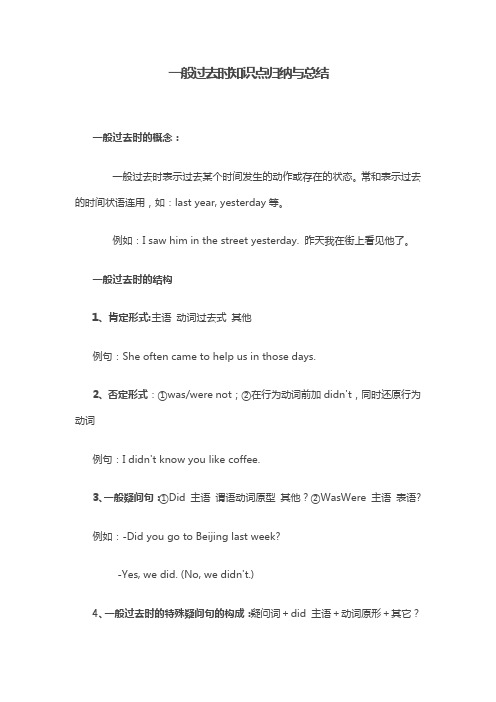
一般过去时知识点归纳与总结一般过去时的概念:一般过去时表示过去某个时间发生的动作或存在的状态。
常和表示过去的时间状语连用,如:last year, yesterday等。
例如:I saw him in the street yesterday. 昨天我在街上看见他了。
一般过去时的结构1、肯定形式:主语动词过去式其他例句:She often came to help us in those days.2、否定形式:①was/were not;②在行为动词前加didn't,同时还原行为动词例句:I didn't know you like coffee.3、一般疑问句:①Did 主语谓语动词原型其他?②WasWere 主语表语?例如:-Did you go to Beijing last week?-Yes, we did. (No, we didn't.)4、一般过去时的特殊疑问句的构成:疑问词+did 主语+动词原形+其它?例如:-What did you do last night?-I did my homework.动词过去式的构成:(1)规则动词过去式的构成有四条规则:①一般在动词原形末尾直接加上-ed。
如:look-looked。
②以不发音的字母e结尾的动词,去e再加-ed。
如:live-lived。
③末尾只有一个辅音字母的重读闭音节(辅元辅结构),先双写这个辅音字母,再加-ed。
如:stop-stopped。
④末尾是辅音字母y结尾的动词,先变y为i,然后再加-ed。
如:study-studied。
(2)不规则动词的过去式需特殊记忆。
如:am(is)-was, are-were, go-went, come-came, take-took, have (has)-had等。
一般过去时口诀一般过去时并不难,表示过去动作、状态记心间。
动词要用过去式,时间状语句末站。
一般过去时的知识点归纳

一般过去时的知识点归纳一般过去时知识点归纳一、一般过去时的定义一般过去时(Simple Past Tense)用于描述在过去某个具体时间发生的动作或存在的状态,以及过去经常或反复发生的动作。
二、一般过去时的构成1. 规则动词:一般在动词原形后加-ed。
- 例:worked, played, visited2. 不规则动词:需记忆其过去式形式。
- 例:went, saw, ate三、一般过去时的用法1. 描述过去具体时间发生的动作或状态。
- 例:He walked to school yesterday.2. 表示过去经常或反复发生的动作。
- 例:When I was a child, I often played football after school.3. 用于时间、条件状语从句中,表示过去将来的动作。
- 例:I said I would call her when I got home.四、一般过去时的标志词1. 具体的时间状语:yesterday, last week, in 1990等。
2. 过去的时间状语:a moment ago, just now, the other day等。
3. 频率副词:never, seldom, sometimes, often, usually等。
五、不规则动词的过去式变化1. 改变元音字母:sing-sang, swim-swam2. 改变辅音字母:begin-began, run-ran3. 完全不规则变化:go-went, come-came, eat-ate六、一般过去时与现在完成时的区别1. 一般过去时强调过去某个时间点发生的具体动作,而现在完成时强调过去发生的动作对现在的影响或结果。
- 例:I visited the museum last week. (强调上周的动作)- 例:I have visited the museum before. (强调现在对博物馆的了解)七、一般过去时的否定句和疑问句1. 否定句:在动词前加did not (didn't)。
一般过去时全文

3.一般疑问句:Be动词 / Did+主语+动词原形+其 他?
如:Were you in school last Friday? Did your mother cook dinner last night? Did you wash your clothes last Sunday?
4.特殊疑问句:特殊疑问词+一般疑问句? 如:I was at home yesterday. → Where were you yesterday?
2. 用所给动词的适当形式填空。 (1)Did you _p_l_a_y_ (play) the piano yesterday? (2)I _w_r_o_t_e (write) a letter last night. (3)Who _c_l_e_a_n_e_d_ (clean) the window yesterday? (4)Sarah__ra_n__ (run) to school this morning. (5)Tom _w_e_n_t_ (go) to the park last Sunday.
1. It
(be) Mary's birthday last Friday.
2. We all
(have) a good time last night.
解析:本题考查动词的过去式。1,2小题中的时间词
last Friday 和last night 都2. had
3. meet _m_e_t__ 6. teach _ta_u_g_h_t 9. fly _f_le_w__ 12. drive _d_r_o_v_e 15. tell _t_o_l_d_
二、用括号内所给动词的适当形式填空。 1. Tom and Mary _c_a_m_e_(come) to China last month. 2. Mary _r_e_a_d_(read) English yesterday morning. 3. There _w_e_r_e_(be) no children here ten minutes ago. 4. What __d_id__ you __d_o__ the day before yesterday?(do) 5. Last week wep_i_c_ke_d_(pick) many apples on the farm.
一般过去时的知识点归纳
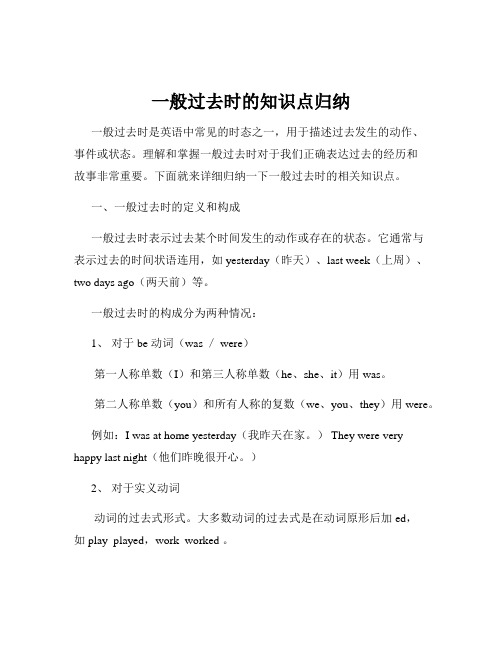
一般过去时的知识点归纳一般过去时是英语中常见的时态之一,用于描述过去发生的动作、事件或状态。
理解和掌握一般过去时对于我们正确表达过去的经历和故事非常重要。
下面就来详细归纳一下一般过去时的相关知识点。
一、一般过去时的定义和构成一般过去时表示过去某个时间发生的动作或存在的状态。
它通常与表示过去的时间状语连用,如 yesterday(昨天)、last week(上周)、two days ago(两天前)等。
一般过去时的构成分为两种情况:1、对于 be 动词(was / were)第一人称单数(I)和第三人称单数(he、she、it)用 was。
第二人称单数(you)和所有人称的复数(we、you、they)用 were。
例如:I was at home yesterday(我昨天在家。
) They were very happy last night(他们昨晚很开心。
)2、对于实义动词动词的过去式形式。
大多数动词的过去式是在动词原形后加 ed,如 play played,work worked 。
但也有一些不规则动词,它们的过去式需要特殊记忆,比如 go went,have had ,do did 等。
例如:He played football last weekend(他上周末踢足球了。
) She had a big party last month(她上个月举办了一个大型聚会。
)二、一般过去时的用法1、表示过去某个特定时间发生的动作或存在的状态。
例如:I met him in the street yesterday(昨天我在街上遇见了他。
)2、表示过去经常或反复发生的动作。
例如:He often went swimming when he was a child(他小时候经常去游泳。
)3、在时间、条件状语从句中,表示过去将来的动作。
例如:She said she would come if she had time(她说如果有时间她会来。
一般过去时

2.动词过去式变化的一般规则
以-e结尾的动词,直接加-d
e.g.: believe---believed waste---wasted shave---shaved live---lived
2.动词过去式变化的一般规则
③ 以重读闭音节结尾并且词尾只有一个辅音 字母的单词,要双写最后一个辅音字母再 加-ed
一般过去时的时间状语
e.g.: She emptied the box ten minutes ago. 十分钟前,她把盒子里的东西倒了出 去。 He went shopping yesterday. 他昨天去逛街了。 His father lived in Russia 2 years ago.两年前他爸爸住在俄罗斯。
e.g.: stop---stopped fit---fitted regret---regretted
2.动词过去式变化的一般规则
④ 以辅音字母加y结尾的动词,把y变成i再 加-ed
e.g.: study---studied empty---emptied cry---criedBiblioteka 2.动词过去式变化的一般规则
2.动词过去式变化的一般规则。
一般的动词后面直接加-ed e.g.: work---worked jump---jumped cook---cooked clean—cleaned (读音规律:清音后面读清音,浊音后面读浊 音,/t/、/d/后面读【id】 e.g.: dust---dusted
一般过去时的时间状语
动词一般过去时的疑问句要借助did,但后 面的动词要变成原型。 e.g.: He made a desk for his son yesterday. Did he make a desk for his son yesterday? Yes, he did. No, he didn’t.
一般过去时

一般过去时一、一般过去时的定义一般过去时表示过去某一时候或某一段时间所发生了的事情或存在的状态。
常与过去时间yesterday, this morning, just now, a moment ago, in May, last night / year / week, once upon a time, the other day, before …, when – clause, in the past连用。
如:What did you do yesterday 昨天你干了什么I met Lin Tao this morning. 今天上午我会到了林涛。
I was there a moment ago. 刚才我在那儿二、用法说明1表示在过去某个时间所发生的动作或所处的状态。
常与yesterday, last week, in 1989, just now, a moment ago, the other day等连用。
如:He was here just now. 他刚才还在这里。
What did you do yesterday 你昨天做了什么事2在过去一段时间内的经常性或习惯性动作。
如:We often played together when we were children. 我们小时候常在一起玩。
注:表示过去经常发生的动作还可用used to 和would。
如:He used to smoke a lot, but he doesn’t now. 他过去经常抽烟,但现在不抽了。
Whenever we were in trouble, he would help us. 每当我们遇到困难,他都会帮助我们。
3表示主语过去的特征或性格。
如:At that time she was very good at English. 那时她英语学得很好。
4用在状语从句中表示过去将来。
如:He said he would wait until they came back.5一般过去时有时可以表示现在,多与 want, hope, wonder, think, intend 等动词连用,使语气更委婉。
一般过去时

一、一般过去时的用法:1. 表示过去的动作或状态,常和明确的过去时间状语连用,如:yesterday, last week, three days ago, in 1998,just now等,或与由when引导的从句连用。
2. 也可以表示过去某一段时间内经常或反复出现的动作。
句子中常带有every day, often, usually, always, sometimes等时间状语。
例:When I worked in the company, I got up early every morning.在那家公司上班时,我每天早晨都起得很早。
In the past few years she usually went touring during her summer holidays.在过去的几年里,每逢暑假她总是出去旅游。
二、一般过去时的形式to be:第一人称单数和第三人称单数用was, 其余的人称用were。
to do(行为动词):行为动词的过去式有两类,一类是规则动词,另一类是不规则动词。
to have: 各人称,单、复数一律用had。
肯定句否定句beI /He/She/It was...I/ He /She/It was not ...We/You/They were...We /You/They were not...haveI /He/She/It/ We/You/They had...I/ He /She/It/We/You/They had not(有) ...I/He/She/It/We/You/They did not have (吃/喝/进行...)…行为动词I /He/She/It/ We/You/They studied…I/ He /She/It/ We /You/They did not study…一般疑问句简略回答beWas he/she/it...?Yes,he was.(No,he wasn’t.)Were we/you/they...?Yes,you were. (No,you were not)haveHad I/he/she/it/you/we/ they...? Did I/you/he... have... Yes,you had.(No,you hadn’t.)Yes,you did.(No,you didn’t.)行为动词Did he/she/ it/ we/you/ they study..?Yes,you did.(No,you didn’t.)I. 一般过去时的概念一般过去时表示过去某个时间发生的动作或存在的状态。
- 1、下载文档前请自行甄别文档内容的完整性,平台不提供额外的编辑、内容补充、找答案等附加服务。
- 2、"仅部分预览"的文档,不可在线预览部分如存在完整性等问题,可反馈申请退款(可完整预览的文档不适用该条件!)。
- 3、如文档侵犯您的权益,请联系客服反馈,我们会尽快为您处理(人工客服工作时间:9:00-18:30)。
加“-ed”后的读音方法
1.ed加在清辅音后面读/t/。 finished /-t/help /-t/asked /-t/ 2.ed加在浊辅音或元音结尾 的,读/d/。 played /-d/lived /-d/enjoyed /-d/ 3.ed加在/t/或/d/后面,读/id/。 wanted /-tid/needed /did/visited /-tid/
2013-8-23
六、句式变化
(一)、一般过去式的一般疑问句1.把was, were放在句首,其余位 置不变。由Was…?引导的一般 疑问句, 肯定答为:Yes,I/he/she/it was. 否定回答为:No,I/he/she/it wasn’t. 如果是第一人称,要把was改为 were。 由Were…?引导的一般疑问句, 肯定回答为:Yes, we/they were. 否定回答为:No, we/they weren’t.
如:(1)John played computer games last night. →Did John play computer games last night? →Yes, he did. (肯定回答) →No, he didn’t. (否定回答)
2013-8-23
(二)、一般过去式的否定句 1.在表示过去存在的状态的句子中,相接在 was, were的后面加上not。 如:(1)He was in the park the day before yesterday. →He was not in the park the day before yesterday (2)We were busy last week. →We were not busy last week 2.在表示过去的时间发生的动作的句子中,要 在行为动词的前面加助动词didn’t.然后把过 去式的行为动词改为动词原形。即:didn’t + 动词原形。 如:(1)She played the violin last night. →She didn’t play the violin last night.
2013-8-23
时间特征
在一般过去时句子中, 通常与下列表示过去的 时间状语连用: yesterday, yesterday morning, yesterday afternoon, yesterday evening, the day before yesterday(前天), last night, last week, last month, last year, a moment ago(刚才), just now(刚才), two days ago, a week ago, in 1990,…
/show/R_CaICby2X5jGYEUrAJefA...html
我在小的时候,我经常在街道上踢足球。 2)My father often drove to work last year. 去年,我爸爸经常开车上班。
句子结构
1.在表示某个时间里存在的状态的句子,系 动词用过式was,were构成。 如:(1)I was at home yesterday. 昨天我在家。 (2)We were in the gym just now. 刚才我们在体育馆。 2.在表示过去某个时间里发生的动作,用动 词的过去式构成。如: I visited my uncle yesterday. 昨天我拜访了我的叔叔。
1、 5._________________________________________ 不规则动词
eg. am—was
go—went get—got
Let’s chant Is, am, was, I was bored. Do, do, did, I had something eat. Feel, feel, felt, I didn’t feel well. Get, get, got, I felt hot. Go, go, went, you were my good friend. Have, has, had, I liked bread. Say, say, said, I went to bed. See, see, saw, I closed the door.
3.各种句式 (1)一般过去时的肯定陈述句: 主语 + 动词过去式 + 宾语或表语 He worked in Shanghai ten years ago. (2)一般过去时的否定句: a.主语 + didn’t + 动词原形 + 宾语。(did + not = didn't ) He didn't do morning exercises yesterday. b.主语 + wasn’t/weren’t +表语。 (was + not = wasn'twere + not = weren't) He wasn't an English teacher ten years ago.
I was born in Shanghai.
Were you born in Shanghai?
否定回答 No, I wasn't
Yes,I was
2.在行为动词的句子中,要用助动词 词did来引导,其余的语序不变。要注 意的是,要把行为动词的过去式改为 原形。肯定回答为:Yes, „did. 否定回答:No, „didn’t.
一 般 过 去 时
主讲人:许江艳 小组成员: 汤郭萍 赵姗 陈曼曼 刘敏 许江艳 汪蓉
一般过去时
1 2 3 4 5
6
概念及含义 句子结构 时间特征 动词过去式的构成规律 加“-ed”后的读音方法 句式变化
概念
1.表示在的过去某个时间里所发生的动作或存在的状态。 时间状语有:yesterday, last week, an hour ago, in 1982等。 如:1)I was at the zoo yesterday. 昨天我在动物园。 2)I went to bed at eleven last nigth. 昨晚我11:00睡觉。 2.表示在过去一段时间内,经常性或习惯性的动作。 1)When I was a child, I often played football in the street.
2013-8-23
(3)一般过去时的一般疑问句: a.Did + 主语 + 动词原形 + 宾语 ? Did you study English in 1990 ? b.Was/Were + 主语 + 表语 ? Was he a pupil five years ago ? (4)一般过去时的特殊疑问句: a.特殊疑问词 + did + 主语 + 动词原形 + 宾 语? Where did your parents live five years ago? What did you do last Sunday? b.特殊疑问词 + were/was + 表语? Who whWho was at the zoo yesterday?ay?y?yesterday? • Who was at the zoo yesterday?
(三)、一般过去式的特殊疑问句
1.What did … ?(主要是询问过去发生了什么事情,注意要把过 去式改为动词原形。) We ate Chinese food last night. →What did we eat last night? 2.Where did?( 主要是询问过去事情发生的地方。) They sang and dance in the music room yesterday morning. →Where did they sing and dance yesterday morning? 3.Who + 动词过去式 … ?( 主要是询问过去事情发生的人物) Mike and Tom climbed mountains last weekend. →Who climbed mountains last weekend?
动词过去式变化规律
动词词尾直接加-ed ———————————————————— eg. work—worked finish—finished listen--listened 2. _________________________________________ 以不发音e结尾,动词词尾加-d eg. like—liked live—lived phone--phoned 以辅音字母加y结尾的动词,把y变成i再加-ed 3.__________________________________________ eg. study—studied carry—carried try--tried 4.._________________________________________ 闭音节动词,双写词尾字母再加-ed eg. stop—stopped skip—skipped shop--shopped
